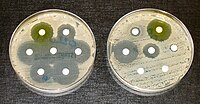
Photo from wikipedia
Background and aims Disruption of the developing microbiota by Caesarean birth or early exposure to antibiotics may impact long-term health outcomes, which can potentially be prevented by nutritional supplements. This… Click to show full abstract
Background and aims Disruption of the developing microbiota by Caesarean birth or early exposure to antibiotics may impact long-term health outcomes, which can potentially be prevented by nutritional supplements. This systematic review aimed to summarise the evidence regarding the effects of prebiotics, probiotics and synbiotics on the intestinal microbiota composition of term infants born by Caesarean section or exposed to antibiotics in the first week of life. Methods A systematic search was performed from inception to August 2022 in Medline and Embase. Two researchers independently performed title and abstract screening (n = 12,230), full-text screening (n = 46) and critical appraisal. We included randomised controlled trials which included term-born infants who were born following Caesarean section or who were exposed to postpartum antibiotics in the first week of life, pre-, pro- or synbiotics were administered <6 weeks after birth and outcome(s) consisted of microbiota analyses. Results Twelve randomised controlled trials investigating Caesarean born infants and one randomised controlled trial including infants exposed to antibiotics were included. Group sizes varied from 11 to 230 with 1193 infants in total. Probiotic (n = 7) or synbiotic (n = 3) supplementation significantly increased the abundance of the supplemented bacterial species (of the Bifidobacterium and Lactobacillus genus), and there was a decrease in Enterobacteriaceae, especially <4 weeks of age. At phylum level, Actinobacteria (two studies), Proteobacteria (one study) and Firmicutes (one study) increased after probiotic supplementation. In three studies on prebiotics, two studies reported a significant increase in Bifidobacteria and one study found a significant increase in Enterobacteriaceae. Discussion Prebiotic, probiotic and synbiotic supplements seem to restore dysbiosis after Caesarean section towards a microbial signature of vaginally born infants by increasing the abundance of beneficial bacteria. However, given the variety in study products and study procedures, it is yet too early to advocate specific products in clinical settings.
Journal Title: PLOS ONE
Year Published: 2022
Link to full text (if available)
Share on Social Media: Sign Up to like & get
recommendations!